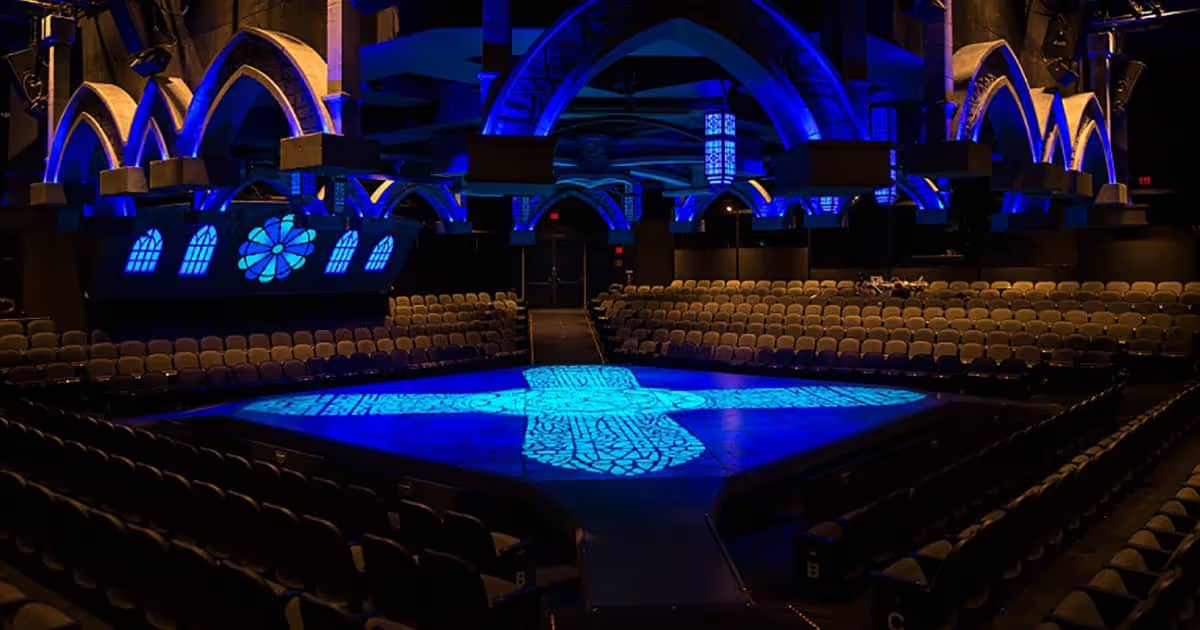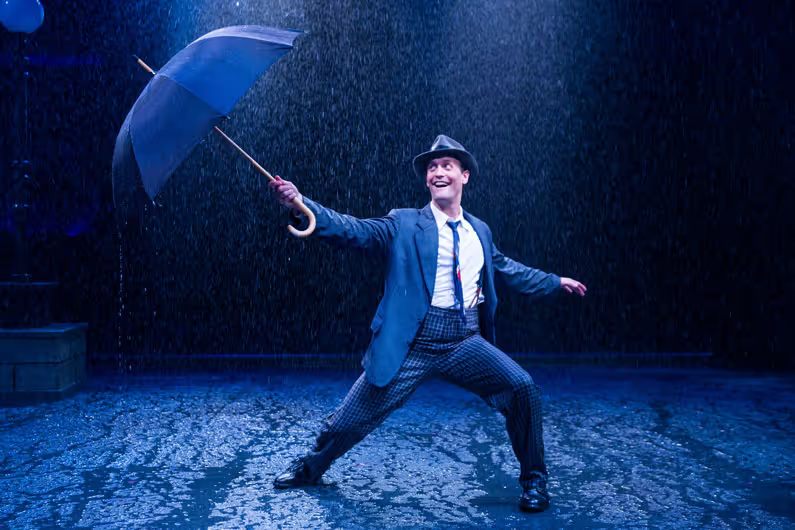Perfect Precipitation
Of all the legendary Oscar-winning films destined to become stage musicals (42nd Street, Grand Hotel, Fame), Singin’ in the Rain, the 1952 MGM movie musical starring Gene Kelly, Debbie Reynolds and Donald O’Connor, seems the most inevitable. It always had too much energy not to seem to burst from the screen. A tribute to American pluck and resourcefulness, it was also a specific salute to the advent of the “talkies” and the colossal egos of Hollywood’s golden age (here enshrined as Monumental Productions). As youth intersected with change, for a moment everything seemed possible: Lindberg had crossed the ocean, cinema could suddenly speak out and talk back, and the Depression was still two years in the future.
The one thing that the flawless flick lacked was literal depth. Two dimensions could barely contain the celluloid energy: Adding a third fully justifies this popular silver screen-to-scorching stage spin-off. Theatrical 3-D brings depth to Betty Comden and Adolph Green’s witty screenplay about Hollywood’s Golden Age and the vintage Jazz Age standards by Nacio Herb Brown and Arthur Freed. In one perfect package we get a live trove of sure-fire gags (“Make “Em Laugh”) and lush ballads like “You Are My Lucky Star,” “Would You?,” “You Stepped Out of a Dream,” and “All I Do Is Dream of You.” Sure, the songs advance the action or editorialize on the emotions, but above all they’re just wonderful to hear, in or out of context.
Youthful exuberance circa 1927 (“Fit as a Fiddle And Ready for Love”) fuels this manic plot of a singer, dancer and actor who combine forces to survive the bumpy transition from vaudeville to silent films to talking pictures. The original choreography, by Gene Kelly and Stanley Donen, effortlessly captured their makeshift creativity: So much tap-dance glory, the nifty dancing in “Broadway Rhythm” and “Good Morning” perfectly parallel the technical improvisation that invented sound cinema.
Another miracle from Marriott Theatre, William Brown’s utterly charming revival reinvents the movie’s sassy style and irreverent gusto. Considering that these live performers only get one “take,” this all-singing, all-dancing, all-acting trio is terrific—Danny Gardner suave as the fame-phobic star who likes to hoof in the rain, Mary Michael Patterson engaging as the deserving ingenue, and plucky Richard Riaz Yoder, full of fun as cut-up Cosmo Brown, though more effective in his rubber-legged frolics than his verbal hijinks. (His love life is left for us to guess–he could well be subduing a constant crush on his partner. In any case Cosmo remains a ball of fire whose clowning constitutes another kind of Hollywood hunger.) As Lina Lamont, the silent-screen phony with the voice of a scorched cat, Alexandra Palkovic works overtime to deserve her delicious comeuppance.
Though Marriott’s arena staging, despite the flying details that Thomas M. Ryan’s scenery provides, can’t match the film’s meticulous detail or previous proscenium productions, by the end sheer spirit and skill carry the night. Simply put, Singin’ in the Rain teems with infectious tunes that demand to be danced–and Tammy Mader’s joy-crammed choreography delivers that spectacular hoofing.
There’s stylish strutting (in the awesome “Gotta Dance” ballet, Hollywood’s homage to Broadway’s bustle), tumultuous tap dancing (in “Good Morning”), and splash-happy waterworks for the title song, performed by Gardner with the happiest feet in six counties. (The downpour is itself elegantly distinctive, more spraying and misting than garden-variety rain—and none wets the crowd.) Terpsichorally speaking, the most delight explodes in “Moses Supposes,” a contagiously carefree case of cutting up for pure pleasure and infectious delight.
Interestingly, unlike any of the three previous productions of Singin’ that I’ve seen, Marriott’s enterprise actually “acts out” the silent films at stake, like the talk-less “The Royal Rascal” and its newfangled successor “The Dancing Cavalier.” Rather than simulated video depictions, we see wonderfully monochromatic reenactments of these fulsome flickers. It works very well.
So for the rest of 2016, Chicago’s savviest song and dance stars will recreate the high spirits of an irrepressible romp. And, yes, it is possible to dance your way into an audience’s collective heart: What is there about tap stepping that gets all the juices to flow, the sap to rise, the sun to shine, and audiences to overdose on unadulterated happiness? A rhetorical question if there ever was one.











